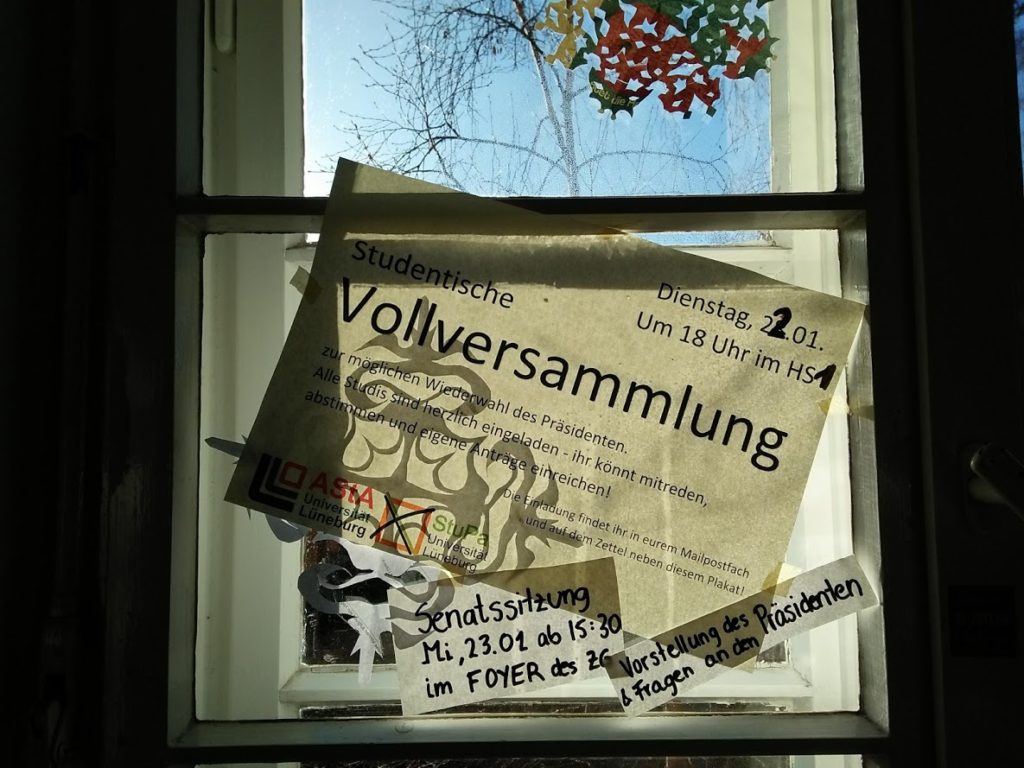Student General Assembly
Last updated 5. March 2025 | Sprecherinnen
On Tuesday, 22.01.2019 at 6 p.m. in HS1, a student plenary meeting will take place to demand a public advertisement for the position of President. All students are cordially invited to attend. You are entitled to vote and submit proposals and we are looking forward to the discussions!

But what exactly is it all about?
President Sascha Spoun’s term of office expires at the end of April 2020. In December 2018, he announced in the Senate that he would be available for a further term of office. Legally, it is possible to re-elect him for a further term of office of eight years without a call for tenders. We are taking this announcement as an opportunity to call for a public advertisement for the position of President of the University of Lüneburg, where President Spoun can also reapply.
What is our criticism?
- After a total term of office of 14 years, structures become entrenched and are less scrutinized. External candidates set their own priorities. This also encourages the incumbent president to critically reflect on their role, be aware of it and propose their own innovative ideas for the coming years.
- Only about a month after the president’s announcement, the election is already taking place – without any press releases or other public statements from the university. This procedure lacks transparency.
- We are by far the largest group at the university and are underrepresented in the Senate – and thus in the election of the president (with only 3 out of 19 votes). This is the case with every decision and is undemocratic in our view!
We recognize the work of and with Mr Spoun and pay tribute to his service to this university, which he has significantly shaped and also advanced. Without him, the university would not be where it is today. Despite all the acknowledged successes, there are and were various circumstances that are worthy of criticism.
This includes, for example, the Central Building, the final accounts for which are still not available, but which are important in the question of President Spoun’s re-election. In addition, the central building has only created 16 seminar rooms, although such a building could have solved the university’s lack of space. Apparently, prestige is more important than good teaching. This also does not fit in with the sustainability claim, which is often more strongly displayed externally than practiced internally. For example, lecturers fly around Germany especially for seminars. Another frequent problem is a lack of transparency, such as the closure of the Master’s degree course in Educational Sciences. Or even now with the announcement of the re-election.
And what exactly is happening now?
On Wednesday, the 23.01.2019 the Senate will meet again. The meeting will start at 2.30 p.m. in C40.256 . Apart from a few items on the agenda, it is open to the university public. From 3.30 p.m., the President presents himself for half an hour in the foyer of the central building, after which the university public can ask questions – including you!
Until then, it’s all about bringing the issue to the public! You can simply get creative: Advertise the plenary assembly and the senate meeting with chalk on campus, inform your fellow students at lectures, and simply approach people in the canteen and invite them.
Further information:
Resolution on the public advertisement for the position of President of the StuPa from 16.01.2019:
The term of office of President Prof. (HSG) Dr. Sascha Spoun expires at the end of April 2020. In December 2018, President Spoun announced in the Senate that he would be available for a further term of office. In accordance with Section 38 (4) of the Lower Saxony Higher Education Act (NHG), it is possible to re-elect theincumbent President for a further term of office of eight years without a call for applications. We are taking President Spoun’s announcement in the Senate in December 2018 as an opportunity to call for tenders for the position of President of the University of Lüneburg, where President Spoun can also reapply. We are in favor of an advertisement for the following reasons in particular:
- After a total term of office of 14 years (1st election = six years, 2nd election (1st re-election) = eight years), procedures and processes have become established and are not scrutinized critically enough. A public invitation to tender and an open application procedure will counteract this.
- External candidates set their own priorities. This also encourages the incumbent president to critically reflect on their role, be aware of it and propose their own innovative ideas for the coming years.
- With the new election, we want to conduct a programmatic debate on the future direction of the university and invite as many members of the university as possible to participate.
Further information on criticism of the study model or specifically the central building can be found at: https://www.asta-lueneburg.de/wp-content/uploads/Festschrift_EineUniversit%C3%A4tf%C3%BCrdas21.Jahrhundert.pdf
More information on the course closure:
https://www.landeszeitung.de/blog/lokales/881242-uni-will-masterstudiengang-bildungswissenschaften-abschaffen
More information on the final settlement of the central building:
A brief review:
In 2007, the planned costs for the central building amounted to 56 million euros, with completion scheduled for 2011. There are many debates about the financing, including from the state parliament, district council and city. Planning permission is then granted in 2011, with completion scheduled for 2014. There are regular postponements and cost increases. The topping-out ceremony is celebrated in January 2015 and the central building is inaugurated in 2017, while further cost increases are reported in the press.
The final statement of costs was supposed to be ready by mid-2018. After this deadline was postponed to the end of 2018, it has now been pushed back once again: In April 2019, it should finally become transparent how much the new building has actually cost. It is estimated to have cost over 100 million euros.
The building is designed more as a work of art than a functional one: Corridors lead into corridors that lead into corridors and rooms are only half-usable in places because they are crossed by slopes that invite you to slide down them. A total of 16 seminar rooms were created, which cannot make up for the lack of space at the university. The result could be that there will be more events at off-peak times (8 a.m. and in the evening) and that the committee-free Wednesday afternoons could be further restricted. Previously, no compulsory events were allowed to be offered on Wednesday afternoons so that students had the opportunity to get involved in initiatives and university policy committees.
Instead of seminar rooms, there is a huge entrance hall that needs to be heated and lit. There is no seating, but there is a grand piano that can be used freely. There is a meditation room on one of the upper floors and a café is to be integrated. It is not yet known at what price which products will be offered there. A major criticism is that there are few offers for students.
The target group tends to be event organizers who can rent the premises for a lot of money (5600 euros + extra costs).
This criticism is so central because the lack of space at the university is becoming more and more noticeable: There are not enough places in the library to work in peace, the queue at the canteen is so long at times that it is no longer worth it for some to leave for their lunch break in half an hour.
Little has been made public about all these (positive and negative) facts from the university side. Most of the information comes from the Critical Festschrift, which can be borrowed from the library, is freely available online, or can be purchased as a book from the AStA office.
Background to the central building:
